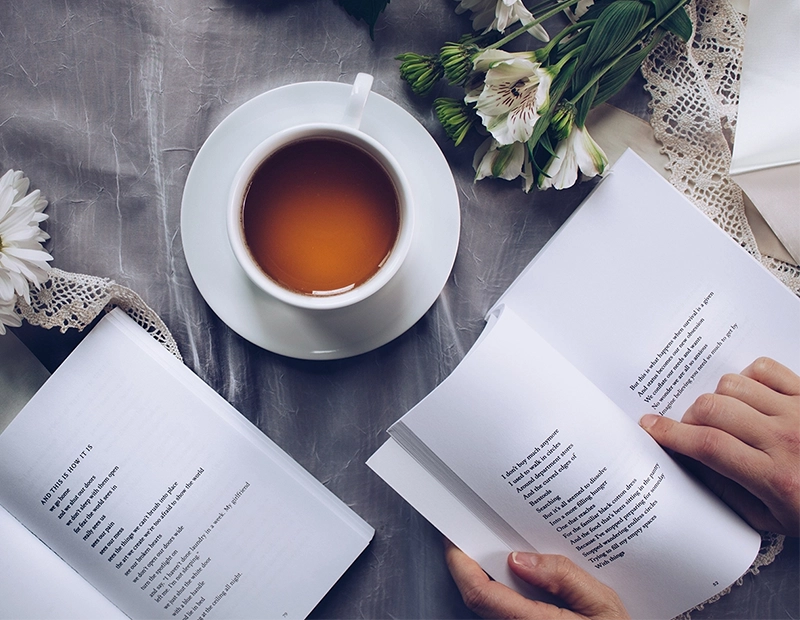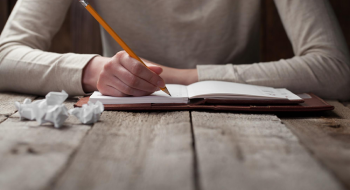How to Write a Poem: Everything You’ll Need to Know

Poetry is a thought-provoking art form to get started in. Although there aren't any formal guidelines for writing poetry, learning how to do so may seem more challenging than learning how to produce a good essay or short story.
Poetry is an excellent literary genre you should explore. It's not only a fantastic way to develop your writing skills, but it's also a fantastic field in which to develop a career. But you should understand a few basics about poetry before you even consider starting. Before you even think of taking up poetry though, you should know a few things about how to write poetry.
What is a poem?
It is a written piece that is arranged according to its beauty, rhyme, and sound. They are meant to express a specific idea, emotion, or experience.
It is one of the oldest writing forms in human history. Various cultures have their own types of poetry, and poems are still relevant to this day. Some of the oldest forms of poetry are the Epic of Gilgamesh, which is around 4,000 years old.
What is the purpose of a poem?
There is really no set purpose for writing a poem. Some people write a poem to tell a story, while others do so to express a feeling. Overall, the main purpose of writing poetry is all about artistry, and conveying one’s own perceptions on life.
What are the different types of poem?
Throughout the centuries, poetry has evolved a great deal. Poems have been around in various forms for thousands of years, and they have evolved according to the culture and the times. Here are some of the types of poetry that you should try.
Epic
This type of poetry is considered one of the oldest in the world. One of the oldest poems in history, The Epic of Gilgamesh is an epic. It is a very lengthy poem, and is written in a more formal style. It usually features a hero or heroine, and recounts feats of strength and bravery. Here is an excerpt from an epic.
Example:
This dog won’t hunt. This horse won’t jump. You get
the general drift. However, he keeps on trying,
but the fire won’t burn, the kindling is wet,
and the faint glow of the ember is weak and dying.
He has no other choice then but to let
It go and take a nap on the ground there, lying
Next to her—for whom Dame Fortune has more
Woes and tribulations yet in store.
- Orlando Furioso by Ludovico Ariosto
Ode
This kind of poetry is of Grecian origin, and is considered one of the oldest in the world. Ode is derived from the Grecian word ‘aiedein’ which means ‘chant or sing’. This was usually in praise of someone, event or even an object. The poetry is accompanied by musical instruments.
Example:
Happy the man, whose wish and care
A few paternal acres bound
Content to breathe his native air
In his own ground.
- Ode on Solitude by Alexander Pope
Free Verse
The free verse format of poetry is relatively new and is by far the freest of all the poetry forms. Thus the name. Its main characteristic is that the verses don’t have to rhyme, and there is no limit to how many lines or stanzas that you could write.
Example:
I celebrate myself, and sing myself,
And what I assume you shall assume,
For every atom belonging to me as good belongs to you.
I loafe and invite my soul,
I lean and loafe at my ease observing a spear of summer grass…
- Song of Myself by Walt Whitman
Elegy
This poetic style is centered on only one topic, which is death. It is written for a person who has passed away and often has melancholic themes. However, you could also give it an optimistic twist if you want.
Example:
Black milk of dawn we drink you at night
we drink you mornings and noontime we drink you evenings
we drink and we drink
A man lives in the house he plays with the snakes he writes
he writes when it turns dark to Deutschland your golden hair Margarete
Your ashen hair Shulamit we dig a grave in the air there one lies at ease
- Fugue of Death by Paul Celan
Rhymed Poetry
As the name implies, this type of poetry is meant to rhyme. The poem should contain rhyming vowel sounds at specific moments. This rhyme scheme is a constant in most poems, and has been in use for centuries.
Example:
Out of the night that covers me,
Black as the pit from pole to pole,
I thank whatever gods may be
For my unconquerable soul.
- Invictus by William Ernest Henley
Haiku
A very old poetry form, haiku, originated in Japan in the 1600’s. It has gained a great deal of popularity over the years and is unique due to its short but potent format. It is limited to three lines. The first and third lines must have five syllables, and the second one has seven. They don’t have to rhyme, but must convey a specific emotion.
Example:
A world of dew,
And within every dewdrop
A world of struggle.
- A World of Dew by Kobayashi Issa
What are the elements of poetry?
Before you start the poetry writing process, it is important that you know what makes up a poem. Here are the five elements of poetry to get you started.
1. Meter
The meter is the basic rhythmic structure of the lines within your poem. The meter is usually made up two components. These are the exact number of syllables, and the overall pattern being emphasized on those syllables.
2. Rhyme
The rhyme within a poem occurs when the final or even more syllables match. These must occur within separate words. The rhyme in a poem usually occurs when the last two words in a verse rhyme with one another.
3. Verse
The term verse is often described as a single metrical line in a poem. While it could represent a single line, it could also represent the entire poem itself.
4. Scheme
This is often described as the rhyming pattern contained within a poem. The composition of the scheme may contain words that rhyme within the stanza, or in alternating lines, or even in couplets.
5. Stanza
The stanza is often described as a group of lines within the poem, and they could follow a regular rhyme and metrical scheme. They are mostly separated by blank spaces or indentations. Stanzas are meant to organize and give shape to a poem.
What are the rules of creating good poetry?
As an aspiring poet, there is really no set rule on how you should do your writing sessions. However, it is important that you should at least have a strategy on how to approach the poetry writing session, and how to get the right inspiration for your poetry writing. Here are some easy to follow rules to follow as a newbie poet.
• Read poetry
Before you start writing poetry, it is important that you are as well-read as possible. No matter how good you are at writing, if you have never really read or heard a poem before, then there is no way you’ll gain proficiency from it.
Take the time to check on the greats such as Pablo Neruda, Oscar Wilde, Sylvia Plath and so many other poets. The more content you read, the better you will be as a poet.
• Start slow
If you just started out as a poet, you should start slow. You could try your hand at poetry writing, but you should not really rush yourself to create great poetry right away. Remember that every writer has to start somewhere. So take your time, and just keep practicing.
• Choose different concepts
When it comes to writing poetry, it is a good idea to write about different concepts. The more concepts you write about, the more multi-faceted your poetry will be. Don’t limit yourself to just a few concepts. You will only limit your growth as a poet.
• Try out different poetry styles
There are many poetry styles, and you should try your hand in all of them. This does not mean that you should build your entire poetry career on them. However, you should at least try them out at least once. You will not only learn more as a poet, you may even expand your repertoire as a poet as well.
• Read out your work
As you write your poems, you should make sure to read them aloud as well. Remember that your poem has to rhyme and sound pleasant to the ear. The poem may sound good on paper, but it sounds awkward when read out. As a rule, you should read out your work during your writing sessions, and make the necessary modifications.
• Make storytelling a key goal
When you write a poem, storytelling must be a key goal. Remember that there should be a sense of cohesion in your writing. As a rule, you should try to tell a story whenever you write a poem. This will make your poems more immersive.
• Reach out to other poets
A great way to further improve your poetry is to reach out to other poets. As a new poet, you may not know the finer points of poetry. Even if you know the basics of poetry writing, you still have a lot to learn. By reaching out to other poets, you will be able to hone your poetry skills more effectively.
• Stay away from clichés
Clichés had become common in the poetry writing scene at the time. Clichés are concepts that have been overused to the extent that readers have grown tired of them. If you want to make your work as original as possible, it is important that you identify these common poetic clichés and never use them.
• Use the five senses
As you write your poem, it is important that you engage all your reader’s senses. This will make your work feel more immersive. When you write your poetry, try to engage all five senses, which are sight, taste, sound, touch, and smell.
• Utilize various writing tools
As you write a poem, you should be as ready as possible. Remember that you will be fully engaged during your writing sessions, so you should make sure that you have the right writing tools on hand.
If you prefer a handwritten approach, you could use a pen and notebook. This does have a more elegant and traditional feel. However, there is nothing wrong with using a tablet or laptop during your writing sessions.
You should also have a dictionary and thesaurus at the ready. You could even download writing software on your phone, tablet, or computer. These apps usually have spell-checks and even a built-in dictionary. This will make the poetry writing process so much easier.
• Have your work looked through
While having your poetry looked through may seem daunting, it is important that you have fellow poets look through it.
Remember that your ultimate goal is to have the public read your work, so it is best if fellow poets go through it. They will be able to point out your poems’s good and bad points and allow you to make the necessary changes.
• Write as much poetry as possible
If you want to be a true poet, it is important that you make poetry a part of your life. You won’t be able to become skilled at poetry overnight. As a rule, you should make poetry writing a habit. Don’t go into poetry in a half-hearted manner. Embrace the poet’s life with a passion, and write poetry every chance you get.
How to write a poem in 7 easy steps
Now that you have a strategy on how to approach the poetry writing process, it is now time to write a poem of your very own. Here are some quick and easy steps that you could follow.
1. Choose a fitting concept
Before you start writing a poem, it is important that you choose a concept. This could be practically anything under the sun. However, your concept should be something that you are passionate about. The more passionate you are about the concept, the more emotion and care you will be able to invest in the poem.
2. Have a free-writing session
Once you have chosen your concept, now is the time to do some free-writing. The free-writing session is like a feeling-out process. You don’t have to come up with a fully realized poem. This is a chance for you to get your bearings and write about the concept without any pressure.
3. Choose the style and form of your poem
After the free-writing session, it is now time to choose the style and form for your poem. There are many forms of poetry that you could write. Just make sure that you know how to write in your chosen style of poetry. Remember that each style has its set characteristics, and you should follow them to the letter.
4. Experiment with your verses
Once you have chosen the style and form of your poem, it is now time to work on your poem. Take your time with the process. Find a good place to write, and experiment with the right tone and words that you use. Don’t be afraid to take risks. Utilize your entire vocabulary of words, and enjoy the process.
5. Read it out loud to an audience
After you have finished writing your first draft of your poem, you should read it aloud to an audience. The audience could be family and friends, or better yet fellow poets. For a first-time poet, this may be a bit scary, but this is a fear that you will have to overcome.
6. Get feedback
Your audience will give you feedback on your poem. As a rule, you should not expect applause. Remember that you are just starting out. So your work won’t really be polished, and your audience will give you both positive and negative feedback. Don’t be offended if you do get negative feedback. Remember, this is for your own progress as a writer.
7. Revise your poem
When you get feedback from your audience, make sure to revise your poem as soon as possible. Revising your poem may seem tedious at first, but you should not think of it as correcting a mistake. Instead, you should think of the revision as a way to enhance your poetry writing skills.
Final thoughts
If you want to try your hand at poetry, it is important that you know the key elements of the writing form. With this article, you will know what constitutes a poem, what kinds of poems there are, and how to write them.
Become a Self-Published Author in 3 Simple Steps
Powered by Experts, Published by You. Reach 40,000+ Retailers & Libraries Around the World. Concierge Service. Tailored Packages. BBB Accredited Business. 100% Royalty Program.


